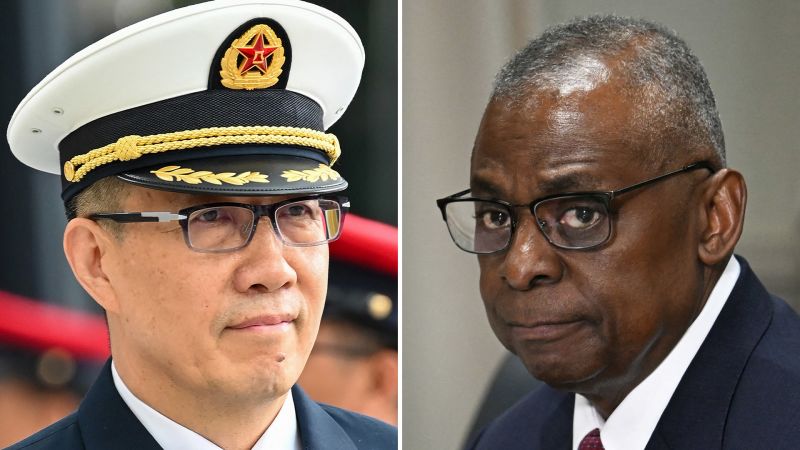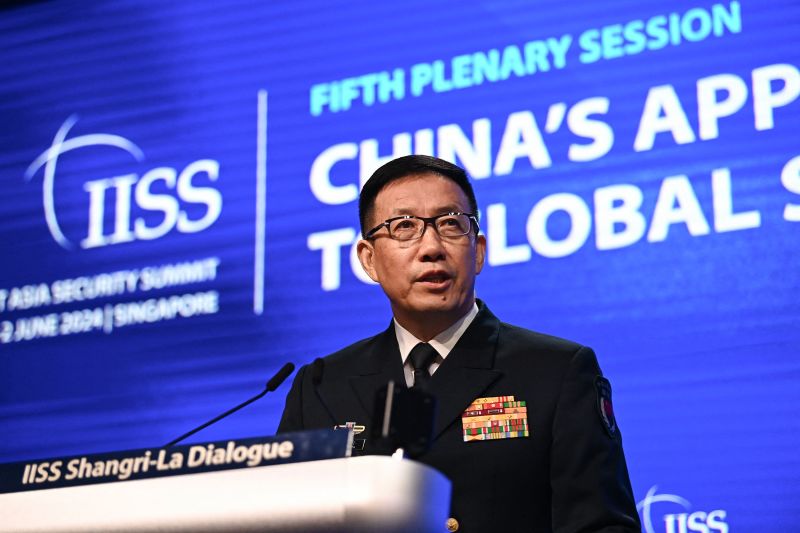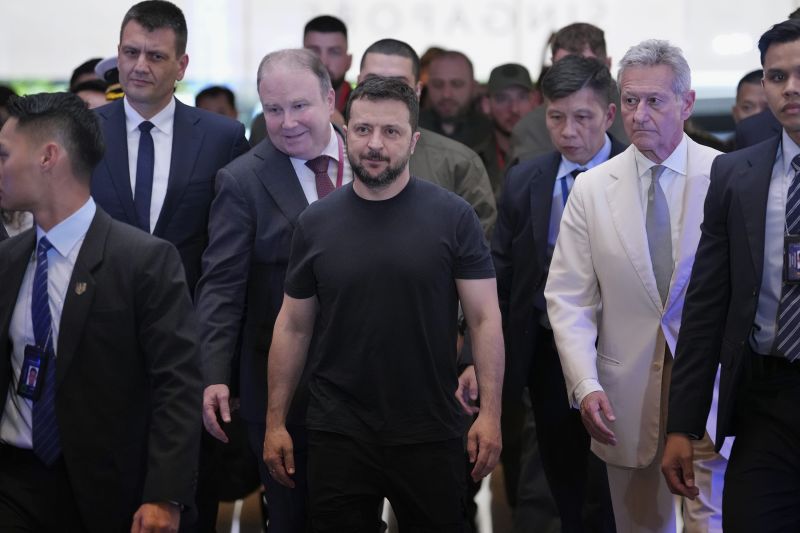
Unveiling Shangri-La: Where Diplomacy Meets Power Play in the Shadows of China and Trump

Step into the luxurious lobby of Singapore's Shangri-La Hotel and witness an intriguing spectacle unfolding. Amidst generals engaging in small talk and polite debates, the looming presence of both China and Trump sets the stage for a captivating narrative.
Any visitor walking through the glamorous lobby of Singapore's Shangri-La Hotel this weekend would have encountered an unusual sight.
The halls of the luxury hotel were filled with military officers from various countries, adorned with gold braids and epaulets on their shoulders. Their dress uniforms displayed a colorful array of bars, resembling a game of Tetris.
Every few minutes, a defense minister confidently walked through the crowd, accompanied by a group of assistants and security personnel.
This event may appear strange to those unfamiliar with it, but the discussions taking place here are of utmost importance and seriousness.
The annual Shangri-La Dialogue is a unique event where warriors, who usually train for conflict, come together for respectful and moderated discussions. The importance of this year's dialogue cannot be overstated.
War rages in both the Middle East and Europe. Meanwhile China’s increasingly assertive moves has much of the Asia-Pacific on edge.
The Singapore summit brought key players together.
Where else could you see the President of the Philippines giving a keynote address on the same stage where China's new Defense Minister makes his debut appearance? The Philippines, whose vessels have been targeted by Chinese coast guard ships in the South China Sea.
Surprisingly, Ukraine's President Volodymyr Zelensky also made an appearance, along with the first meeting between US Secretary of Defense Lloyd Austin and Chinese counterpart Adm Dong Jun.
Events in Asia, specifically China's actions in the region, were a prominent topic at the conference held in Singapore.
During his keynote address, Philippine President Ferdinand Marcos Jr. highlighted the ongoing tensions between Philippine and China Coast Guard ships in a disputed area of the South China Sea.
"If a Filipino citizen is intentionally killed," he mentioned, "that, in my opinion, is almost equivalent to what we consider an act of war."
A couple of days after, Adm Dong of China responded from the same platform, alleging that the Philippines was engaging in "blackmail" during the maritime conflict.
Admiral Dong Jun mentioned that there is a limit to their restraint.
Dewi Fortuna Anwar, a research professor at Indonesia's National Research and Innovation Center, saw Admiral Dong Jun's statement as a threat. She has been attending the Shangri-La Dialogue since it was established twenty-one years ago.
"In the past, only a few Chinese attendees were present and they tended to be very quiet," she mentioned. "But nowadays, they are much more self-assured and actively participate in all the sessions."
The Shangri-La Dialogue's open format allows delegates to directly ask speakers tough and straightforward questions, offering a special chance for interaction.
China’s Minister of National Defense Adm. Dong Jun, left, and US Defense Secretary Lloyd Austin, right.
China’s Minister of National Defense Adm. Dong Jun, left, and US Defense Secretary Lloyd Austin, right.
Getty Images
Related article
US and Chinese defense chiefs recently had their first face-to-face meeting since 2022.
During a speech on Sunday, Dong from China faced numerous questions from the audience regarding Beijing's growing threats towards Taiwan and its disputed claims in the South China Sea. He responded in a straightforward manner.
He said that the "separatists" in Taiwan's newly-elected government would be "nailed to the pillar of shame in history."
At the same time, Chinese military officers also took the opportunity to express their opinions during Q&A sessions at other important times.
Senior Colonel Yanzhong Cao of China’s People’s Liberation Army asked US Secretary of Defense asked US Defense Secretary Lloyd Austin whether the US was trying to build a NATO-like alliance in the Asia-Pacific region, adding the claim “the eastward expansion of NATO has led to the Ukraine crisis.”
In response, Austin respectfully disagreed with Colonel Cao's assertion. The audience in the ballroom then erupted into a rare burst of applause.
Austin pointed out that the Ukraine crisis was clearly a result of Mr. Putin's decision to unlawfully invade his neighbor. This decision by Mr. Putin sparked the crisis.
Later that day, Ukrainian leader Zelensky received a warm welcome akin to that of a rock star when he unexpectedly appeared at the conference in his iconic fatigues and black t-shirt.
"We stand with you," Singapore's defense minister Ng Eng Hen reassured Zelensky.
However, during Zelensky's speech, the large group of Chinese army officers were missing. Zelensky also mentioned that he was unable to arrange a private meeting with Chinese officials during his visit to Singapore.
Zelensky accused Beijing of supporting Russia in the conflict with Ukraine. He expressed concern that China's assistance to Russia would prolong the war, which he believed would have negative consequences for the entire world. Zelensky emphasized that China's policies, which profess to support territorial integrity and sovereignty, would be undermined by their support for Russia in this conflict.
It was not clear whether Zelensky succeeded in securing new support for Kyiv from non-aligned south-east Asian countries like Malaysia and Indonesia.
China's Defense Minister Dong Jun speaks during the Shangri-La Dialogue summit in Singapore on June 2.
China's Defense Minister Dong Jun speaks during the Shangri-La Dialogue summit in Singapore on June 2.
Nhac Nguyen/AFP/Getty Images
Related article
Those who back Taiwan independence face ‘self-destruction,’ China’s new defense minister warns in combative summit speech
Instead, the new leader of Indonesia, President-elect and retired general Prabowo Subianto, focused his speech on calling for an end to the violence in Gaza and for an investigation into recent Israeli attacks that resulted in the deaths of many displaced civilians in Rafah.
Another important topic that was discussed was the future direction of the United States.
The Singapore gathering started shortly after a jury in New York City found former US President Donald Trump guilty of falsifying business records in his hush money trial.
Many in Asia are closely monitoring the possibility of Trump returning to office in November and how it could affect the continent, which is already dealing with significant geopolitical challenges.
US lawmaker Michael McCaul, Chairman of the House Foreign Affairs Committee, abruptly cancelled a scheduled interview with CNN, showing clear discomfort with the news.
Fellow Republican Senator Dan Sullivan also avoided discussing Trump during a meeting with journalists, choosing to direct reporters to a press release instead.
Sullivan's statement expressed deep sadness for America and the rule of law, describing the verdict as a severe misuse of our justice system. However, the Senator from Alaska acknowledged America's dedication to liberty and democracy in a conversation with journalists. He highlighted this as a strength in the face of authoritarian aggression from countries like China, Russia, Iran, and North Korea.
Sullivan was part of a bi-partisan delegation seeking to demonstrate Congressional commitment to US allies in Asia.
“The dictators we are allied against…are ally poor,” Sullivan said.
There are concerns about the reliability of the US, as highlighted by an academic from Japan, which is Washington's closest ally in Asia. During a discussion with defense chiefs from Singapore and Malaysia, he expressed worries about the possibility of Trump being re-elected, referring to it as a "nightmare" scenario.
That triggered nervous laughter from the audience and on stage.
Singapore’s Dr. Ng Eng Hen gamely responded, “we will work with any administration in any country if we can find common ground.”
I have a clear memory of the shared anxiety at the 2017 Shangri-La Dialogue, which took place shortly after Trump became president.
At that time, James Mattis, who was the secretary of defense, made it a point to comfort the American defense allies who were concerned about the unpredictable new president.
"Mattis reassured the audience to be patient, as they questioned whether the 'America First' leader would disrupt the post-World War II system."
Ukraine’s President Volodymyr Zelenskyy, center, arrives at a hotel, the venue of the 21st Shangri-La Dialogue summit at the Shangri-La Hotel in Singapore, Saturday, June 1, 2024.
Ukraine’s President Volodymyr Zelenskyy, center, arrives at a hotel, the venue of the 21st Shangri-La Dialogue summit at the Shangri-La Hotel in Singapore, Saturday, June 1, 2024.
Vincent Thian/AP
Related article
Zelensky makes surprise stop at Singapore defense gathering as Ukraine pushes for its peace plan amid Russian advance
After exploring all other options, Americans will ultimately make the right decision. We will continue to stand by their side.
Seven years later, policymakers are grappling with various challenges, including the uncertain political landscape in the US.
One by one, military leaders expressed their worries about various global issues such as climate change, nuclear threats, conflicts in Europe and the Middle East, and the potential for a dangerous escalation between the US and China.
Dr. Ng, the defense chief of Singapore, cautioned that the world is not prepared to handle another major geopolitical crisis, especially in light of recent conflicts in Gaza and Ukraine.
In this tense geopolitical environment, it's much more beneficial for commanders to gather in a five-star hotel wearing their dress uniforms, rather than facing off on the battlefield with guns aimed at each other.
Editor's P/S:
The Shangri-La Dialogue, an annual gathering of defense ministers and security experts, provides a unique platform for open and respectful discussions on pressing global issues. This year's dialogue took place amid heightened tensions in the Asia-Pacific region, with the ongoing conflict in Ukraine and China's assertive stance in the South China Sea dominating the agenda.
The event showcased a diverse range of perspectives, with Philippine President Ferdinand Marcos Jr. expressing concerns over Chinese aggression, while Chinese Admiral Dong Jun defended Beijing's actions. Ukrainian President Volodymyr Zelensky's surprise appearance and impassioned speech highlighted the global impact of the Ukraine crisis and the need for international support. The dialogue also addressed the future direction of the United States, with participants expressing concerns about the possibility of former President Donald Trump's return and its potential implications for the region. By facilitating open and constructive dialogue, the Shangri-La Dialogue serves as a valuable forum for addressing complex geopolitical challenges and promoting cooperation amidst global tensions.











